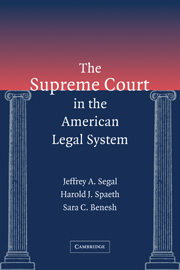Book contents
- Frontmatter
- Contents
- List of Illustrations
- List of Tables
- Preface
- I INTRODUCTION
- 1 Judicial Policy Making
- 2 Approaches to Judicial Decision Making
- 3 The Supreme Court in American Legal History
- II JUDICIAL PROCESS
- III LOWER COURTS IN THE AMERICAN LEGAL SYSTEM
- IV THE SUPREME COURT
- V IMPACT
- Case Index
- General Index
1 - Judicial Policy Making
Published online by Cambridge University Press: 05 June 2012
- Frontmatter
- Contents
- List of Illustrations
- List of Tables
- Preface
- I INTRODUCTION
- 1 Judicial Policy Making
- 2 Approaches to Judicial Decision Making
- 3 The Supreme Court in American Legal History
- II JUDICIAL PROCESS
- III LOWER COURTS IN THE AMERICAN LEGAL SYSTEM
- IV THE SUPREME COURT
- V IMPACT
- Case Index
- General Index
Summary
December 12, 2000, 10:00 p.m.
Without any fanfare at all, the Supreme Court's public information officer released the decision. The case, one of dozens filed regarding the events of November 4, began when the Gore campaign filed suit in a Florida circuit (trial) court, contesting the officially certified results of Florida's presidential election tally.
That official certification, made by Secretary of State Katherine Harris on November 26, had itself been the subject of innumerable suits, including one over Palm Beach County's infamous “butterfly” ballot, which led thousands of Gore supporters to vote mistakenly for the right-wing third-party candidate Pat Buchanan; a few other suits contesting the thousands of undercounted votes resulting from dimpled, pregnant, and hanging chads on the antiquated IBM punch cards; and, most notably, Harris's decision to use her seemingly discretionary authority not to accept recounted votes past Florida's one-week statutory deadline. That decision had been overturned by the Florida Supreme Court, which extended the recount deadline to November 26. Eventually, the U.S. Supreme Court remanded (sent back) that decision to the Florida Supreme Court for further clarification, but before the recount could be completed even the Florida Supreme Court's deadline had passed, and Harris, who cochaired Bush's Florida campaign, certified Bush the winner.
The Gore campaign contested the results of the certification under the provision of Florida law that allowed judicial review of the certification if the election results include “receipt of a number of illegal votes or rejection of a number of legal votes sufficient to change or place in doubt the result of the election.”
- Type
- Chapter
- Information
- The Supreme Court in the American Legal System , pp. 3 - 18Publisher: Cambridge University PressPrint publication year: 2005



